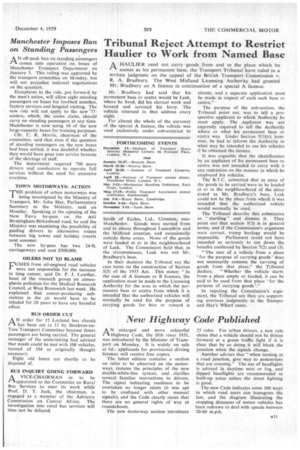Tribunal Reject Attempt to Restrict Haulier to Work from Named Base
Page 37

If you've noticed an error in this article please click here to report it so we can fix it.
AHAULIER need not carry goods from and to the place which he
names as his permanent base, the Transport Tribunal have ruled in a written judgment on the appeal of the British Transport Commission v. R. A. Bradbury. The West Midland Licensing Authority had granted Mr. Bradbury an A licence in continuation of a special A licence.
Mr. Bradbury had said that his permanent base or centre would be Leek, where he lived, did his clerical work and housed and serviced his lorry. The vehicle returned to that address every night.
For almost the whole of the currency of the special A licence, the vehicle was used exclusively under sub-contract to Smith of Eccles, Ltd., Urmston, near Manchester. Goods were carried fro.m and to places throughout Lancashire and the Midland counties, and occasionally outside those areas. None of the goods were loaded at or in the neighbourhood of Leek. The Commission held that, in the circumstances, Leek was not Mr. Bradbury's base.
In their decision the Tribunal say the case turns on the construction of Section 5(3) of the 1933 Act. This states: "In the case of A licences or B licences, the application must be made to the Licensing Authority for the area in which the permanent base or centre from which it is intended that the authorized vehicles will normally be used for the purpose of carrying goods for hire or reward is situate, and a separate application must be made in respect of each such base or centre."
The purpose of the sub-section, the Tribunal point out, was to tell a prospective applicant to which 'Authority he must apply. The applicant was not expressly. required to tell the Authority where or what his permanent base or centre was. Under Section 5(I)(c), however, he had to inform the Authority in whit way he intended to use his vehicles if he obtained the licence.
It was arguable that the identification by an applicant of his permanent base or centre was not intended to carry with it any restriction on the manner in which he employed his vehicles.
The B.T.C. submitted that as none of the goods to be carried were to be loaded at or in the neighbourhood of the place stated as Mr. Bradbury's base, Leek could not be the place from which it was intended that the authorized vehicle would normally be used.
The Tribunal describe this submission as "startling" and dismiss it. They point out that section 5(3) is in general terms, and if. the Commission's argument were correct, tramp haulage would be impossible. Parliament could not have intended so seriously to cut down the benefits conferred by Section 7(2) and (3).
"The user of a vehicle from a place ° for the purpose of carrying goods' does not necessarily connote the carrying of goods from that place." the Tribunal declare. "Whether the vehicle starts from a place empty or loaded, it can be said to be used from that place for the purpose of carrying goods '."
In rejecting the Commission's argument, the Tribunal say they are supporting previous judgments in the Stamper and Hay's Wharf cases.
























































































































